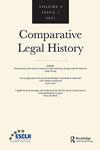国王作为法官:权力、正义和议会的起源
IF 0.5
Q2 LAW
引用次数: 5
摘要
西欧的代议制政府是软弱统治者的自然结果吗?统治者是否被迫向选民让步,让他们放弃收入(用于资助政府运作的税收和贷款),以换取参与立法会议?在她的研究《作为法官的国王》中,布科扬尼斯认为,权力中心的力量是解释代议制机构发展的更好方式。她将证据集中在该中心伸张正义的能力上(28-36页)。Boucoyannis认为,皇室集中权力的野心先于“城市商业阶级”的要求,后者寻求兑现“无代表不征税”的座右铭,即要求在国家治理中发挥作用(8-9)。在13世纪的英格兰——一段“公认的关于同意征税的持续斗争”的时期(98-104)——男爵们在“被迫向国王授予”数不清的金钱之后,在1240年代拒绝了国王的征税要求(99)。但当时“没有代表被召集”(99人)。“因此,13世纪初和末期的冲突是相似的:男爵们围绕《大宪章》的反对,尽管有短暂的挫折和无情的冲突,但王室的相对优势越来越大”(101)。布科扬尼斯得到了约翰·麦迪科特(John Maddicott)的支持,他认为“压迫的相似性”(他的说法)使“贵族和骑士团结起来对抗国王,代表社会”(100-01)。她认为,维护权力的“初始国家能力”(104)可能是实现“全政治机构”的一个重要因素(8-9)。依靠约瑟夫·熊彼特1918年的论文《税收国家的危机》——布科扬尼斯称之为这方面的“权威论文”(104页)——一个方法论的观点也成为焦点本文章由计算机程序翻译,如有差异,请以英文原文为准。
Kings as judges: power, justice, and the origins of parliaments
Was representative government in Western Europe the natural outcome of weak rulers? Were rulers forced to concede power to constituencies who bargained away revenue (taxes and loans to fund government operations) in return for participation in legislative assemblies? In her study Kings as Judges, Boucoyannis argues that strength at the centre is a better way to explain the growth of representative institutions. She concentrates her evidence on the centre’s capacity to deliver justice (28–36). Boucoyannis argues that the royal ambition to centralize power preceded the claims of ‘urban mercantile classes’ who sought to cash out the motto ‘no taxation without representation’, that is, to claim a role in national governance (8–9). In thirteenth-century England–an interval of ‘admittedly constant battle over consent’ to taxation (98-104)–barons refused the King’s demands for taxation in the 1240s, after having been ‘forced to grant “countless sums of money” to the King’ (99). But ‘no representatives were called’ at that time (99). ‘Conflict at the beginning and end of the thirteenth century was therefore similar: baronial opposition articulated around Magna Carta and, despite temporary set backs, and relentless conflict, an increasing relative advantage of the crown’ (101). Boucoyannis draws support from John Maddicott who has argued that ‘similarity of oppression’ (his phrase) brought ‘lords and knights together to counter the crown and to represent the community’ (100-01). ‘Initial state capacity’ to assert power (104), she argues, can be a significant factor in bringing about ‘polity-wide institutions’ (8-9). Relying on Joseph A Schumpeter’s 1918 essay ‘The Crisis of the Tax State’–which Boucoyannis calls the ‘canonical essay’ on this point (104)–a methodological point also comes into focus, one which
求助全文
通过发布文献求助,成功后即可免费获取论文全文。
去求助
来源期刊
CiteScore
1.70
自引率
0.00%
发文量
20
期刊介绍:
Comparative Legal History is an international and comparative review of law and history. Articles will explore both ''internal'' legal history (doctrinal and disciplinary developments in the law) and ''external'' legal history (legal ideas and institutions in wider contexts). Rooted in the complexity of the various Western legal traditions worldwide, the journal will also investigate other laws and customs from around the globe. Comparisons may be either temporal or geographical and both legal and other law-like normative traditions will be considered. Scholarship on comparative and trans-national historiography, including trans-disciplinary approaches, is particularly welcome.

 求助内容:
求助内容: 应助结果提醒方式:
应助结果提醒方式:


